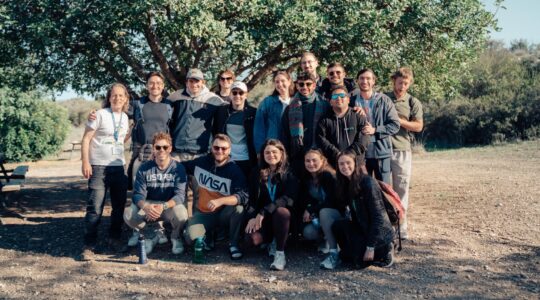ALEPPO, Syria – The muezzin’s afternoon call to Islamic prayers drifted through the open window of Aleppo Eye Specialist Hospital, as Dr. Joel Weinstein examined 25-year-old Gina Khachadoarian with an ophthalmoscope.The young woman, who’d been complaining of double vision, waited patiently as Weinstein discussed her case with a local doctor. On this particular day, half a dozen other people also hoped to visit with Weinstein, a Chicago-born physician, including an elderly man with cataracts and a father whose baby boy had been involved in a car accident.”I’ve seen a lot of people coming in with end-stage glaucoma who should have been examined years ago,” Weinstein told JTA in between consultations. “This girl Gina probably has multiple sclerosis. Had she been born in the United States, she would have had one or two MRI scans by now.”Gina has no idea that Weinstein, 60, is Jewish. Nor do any of the other 50-odd patients he saw last month during his week-long Orbis International stint in Syria.”I think they just viewed me as another American,” says the ophthalmologist, who lives in Hershey, Pa. “And I don’t think they realize Weinstein is a Jewish name.”Not that it would have mattered much.In a country with only one ophthalmologist per 26,000 inhabitants – and where more than 900,000 people suffer from blindness or low vision – specialists like Weinstein are in hot demand, regardless of their religious beliefs.The mission to Aleppo marked the third in Syria for Orbis, a New York-based nonprofit organization that operates the world’s only airborne ophthalmic surgical and training facility. Both previous Syria programs – in June 1997 and September 1998 – focused on Damascus. Weinstein, a full-time professor at Penn State University, was on the latter mission.”I was worried that there would be a safety issue, and there wasn’t,” said the doctor, whose wife, Tilly, accompanied him to the Middle East. “Truthfully, I would be more afraid going to Israel, where there is violence.”The Flying Eye Hospital staffed by Orbis is a converted DC-10 aircraft equipped with operating, recovery, sterilization and laser treatment rooms, as well as audiovisual and conference facilities. During the three-week Orbis program in Aleppo, more than 190 local eye-care professionals and 370 patients participated in the training and treatment program.Orbis says its mission is “to eliminate avoidable blindness and restore sight in the developing world, where at least 90% of the blind and visually impaired reside.” Programs utilize both the DC-10 aircraft and specialized eye hospitals in host countries whenever possible, and specialists like Weinstein volunteer their time in exchange for airfare, hotel accommodations and all meals while on the program.”I think the difference Orbis can make is not so much in the number of surgeries, but in passing on knowledge to our doctors,” said Dr. Harout Balian, director of the Aleppo Eye Specialist Hospital. “We benefit from the experience and knowledge of these very specialized people, who bring us the latest in ophthalmology and surgical procedures.”In the Middle East, cataracts account for nearly half of all blindness, followed by corneal scars and glaucoma. Diabetes, which can lead to blindness, is also a serious problem in Syria – whose president, Bashar al-Assad, happens to be an ophthalmologist.Weinstein was the only Jew among the 15 U.S. and foreign physicians comprising the Orbis team recently sent to Aleppo. But the adventurous eye doctor told JTA he wasn’t about to allow his Jewish identity get in the way of visiting Syria, a longtime enemy of Israel.Growing up in a secular household, Weinstein celebrated his Bar Mitzvah at a Reform congregation in Skokie, Ill.”At one point, I wanted to go into physics, but I realized it would be kind of lonely,” he said. “One year during college, I started working at a hospital in Chicago. My job was to bring TVs to patients’ rooms. I had a lot of spare time, so I got to know the patients and the doctors. It seemed really interesting, especially trying to figure out how the brain interprets what the eye sees.”After graduating from Yeshiva University’s Albert Einstein College of Medicine, Weinstein became an ophthalmologist, eventually ending up as a professor at the University of Wisconsin in Madison. In the mid-1980s, he developed an interest in volunteering for short stints in Third World countries, which is what originally led him to Orbis.”They had a list of places that needed doctors, some of which required neuro-ophthalmology, which is one of my two specialties,” he said, “the other being pediatric ophthalmology.”Weinstein’s first mission with Orbis was in 1987, to Guatemala. He’s also volunteered in Ethiopia, Nigeria and Uzbekistan. But Syria – home to only 50 Jews out of a total population of 18.5 million – holds a particular fascination for Weinstein. Because the country’s once vibrant Jewish community has virtually disappeared, today’s Syrians rarely have the chance to meet Jewish people, especially since Israelis and anyone with Israeli stamps in their passports are forbidden from entering the country.Even so, he said, “the people were really nice and well-educated. They say Americans don’t fully understand the issues Syria has with Israel, and that they’d personally like to see peace.”Weinstein did get very sick toward the end of his trip – he’s pretty sure it was food poisoning – but even that hasn’t soured him on Syria.”We were told not to bring up any political issues, yet the Syrian doctors wanted to ask us what we thought about current events,” he said. “The Syrians were very open. I would absolutely go back again.”
JTA has documented Jewish history in real-time for over a century. Keep our journalism strong by joining us in supporting independent, award-winning reporting.





